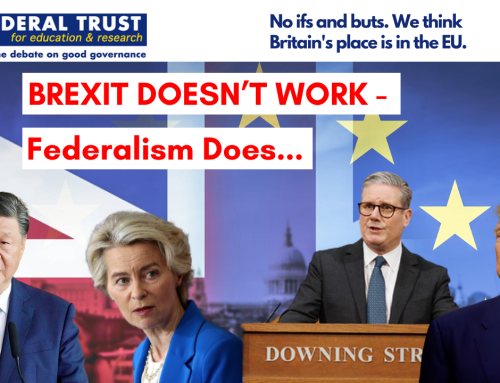Corbyn Should Stop The UK’s Drift Out Of The EU
by John Palmer
10th January 2018
This article first appeared on Social Europe.
My friend John Weeks’ argument in Social Europe that Theresa May’s conclusion of a ‘First Stage’ Brexit agreement signals that the UK is now irreversibly on its way out of the European Union is premature. At a time of economic and political near-chaos – in the heart of government – it is impossible to predict political developments years or even months ahead with confidence, let alone pre-judge the final outcome of the Brexit drama.
The case for despair about the UK staying in the EU rests heavily on a belief that nothing can now prevent the UK becoming a non-member by the end of March 2019. Michel Barnier, the chief EU negotiator, is indeed aiming for an agreement on the “transitional arrangements” to follow Brexit to be concluded by November of this year.
At a pinch, that might allow time for the agreement to be ratified by March 2019; at which point the UK would actually leave the EU. In London. The widespread impression had been given that the transition negotiations would only conclude by March 2019.
But the timing of both the Article 50 negotiation period and (more importantly) the duration of the planned Transitional Phase to follow are highly uncertain. More time may be needed in the Art 50 negotiations to agree both the complex legal conditions which will be linked to any UK access to the EU Single Market and Customs Union during the subsequent transitional phase and also what kind of long-term relationship the EU and UK should be aiming for.
Exploring an extension of the Article 50 negotiating process during the course of next few months would not come as a surprise. A truncated negotiation leading to ‘no agreement’ might suit some members of the May Cabinet who are ready to exploit any crisis in the talks to force an early and very ‘hard’ Brexit.
But such a move could very easily trigger a full-scale split in the May cabinet. Even if the Brexit ultras got their way, it is unlikely that there would be a UK parliamentary majority to ratify such a “jump-over-the-cliff” deal. The EU itself would also have much to lose in such a crisis which would make it far harder to negotiate long-term close cooperation on security, foreign policy, policing and other issues.
Playing It Long
So, both sides are more likely to ‘play for time’ if problems arise. Contrary to what some Leave militants claim, the UK does have the right to request such a revocation of Article 50 if it changes its mind about Brexit. The primary authors of Article 50, Lord Kerr, and the former EU constitutional law supremo, Jean-Claude Piris have repeatedly testified to this.
Another possibility – sometimes used in tricky EU negotiations in the past – might simply be to “Stop the Clock” for a finite period if a limited extension might allow at least an outline agreement of the nature of the future EU/UK post-Brexit treaty to be agreed. But, if the negotiations do have to be extended for any reason, then the start of the Transitional Phase (now seen as lasting ‘about two years’) will also have to be delayed.
There are other threats to the ultimate Brexit timetable. Even if a long-term outline agreement on future EU/UK relations is agreed in principle in the months ahead, it may take much longer to convert this into detailed arrangements covering customs controls, standards and dispute arbitration rules than some British ministers seem to realise.
The final Brexit agreement and the EU/UK trade and cooperation treaty will, in any case, have to be ratified by the EU institutions and all 27 EU member states as well as by Westminster. During the transition (however long) the UK will be free to ‘explore’ new trade deals with the US and other global economic powers. But it will not be able to conclude any legal trade agreements of its own.
Given the awesome complexity of the issues under negotiation it is quite possible that the UK’s final Brexit transition might come to an end not in 2020, but in 2021 or even 2022. Throughout this extended farewell the UK will still be bound to observe most, if not all, of the legal, financial and other obligations to the EU it has as a member.
Some Tory Brexiteer MPs have (not entirely inaccurately) denounced such a ‘half in/half out’ compromise – even on a temporary basis – as leaving the UK as a kind of ‘vassal state’ of Brussels. It certainly would leave the UK as a mere law taker from the EU without voice or vote in any future law making.
Labour’s Key Role
2022 is a very important date for another reason. A new UK general election must be held no later than March 2022 under the terms of the new Fixed Term Parliament Act. The political climate in the run-up to the next election could prove decisive in shaping the final outcome of the entire Brexit drama.
Most Labour voters believe the UK should remain in the EU. An even greater majority of Labour Party members take the same view as do members of the pro-Jeremy Corbyn Momentum organisation. Some remorseful Labour Leave voters are changing their minds.
In a frequently confused and bitter public debate about Brexit the Parliamentary Labour Party has sought to build the broadest possible united front among both Remain and Leave Labour supporters. But Labour has now determined that the UK should retain full access to the EU Single Market and Customs Union.
If there is an election before Brexit becomes a reality, Labour should reject the craziness of the UK ending up as a non-voting, law-taking – not law-making – subordinate as the price for this access. While opposing any reduction of UK labour, social and environmental standards after Brexit it should also give full public support to the renewed drive in the EU for higher social and environmental standards (including the proposed new European Labour Authority).
Stronger In A Reformed EU
Labour should drive home the message that being part of a stronger and reforming EU is an essential means for advancing its programme for radical economic and social reform at home. Social democratic, socialist and green parties in the EU believe this is the real basis of Jeremy Corbyn’s approach which is one reason why he was so warmly received during recent meetings in Europe.
If Corbyn is elected PM before the die is cast on the final shape of the UK/EU relationship, he should seek immediate negotiations of his own with the EU. As the incoming PM, leading a government with a new mandate, this would be very unlikely to be denied.
If, however, Labour does not take power until the UK is fully outside the EU, a Corbyn-led government should unilaterally pledge to fully match all future progressive economic, social, labour and democratic reforms agreed at EU level, coordinate closely with the EU on a new Europe-wide economic recovery strategy and serve notice it will seek renewed full membership of a reforming EU at the earliest opportunity.
***
John Palmer was the European Editor of The Guardian between 1975 and 1996. He was subsequently a Founder and Political Director of the European Policy Centre in Brussels until 2007 and is now a member of the Governing Council of the EPC. He is a Visiting Practitioner Fellow at Sussex University’s European Institute and a member of the Council of the Federal Trust in London.






